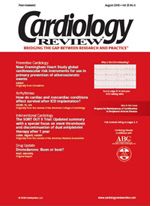Publication
Article
Early MI treatments have differing benefits
CORONARY ARTERY DISEASE
Orlando—Early clopidogrel (Plavix) therapy after acute myocardial infarction (MI) shows a clear reduction in mortality and reinfarction for all patients, while early treatment with a beta blocking agent should be reserved for low-risk patients, according to results of the Clopidogrel and Metoprolol Infarction Trial Second Chinese Cardiac Study (COMMIT/CCS-2).
“We demonstrated that adding 75 mg of clopidogrel to aspirin as well as other standard therapy produced highly significant reductions in hospital mortality and other major events without any significant increase in major bleeding,” said Zhengming Chen, MD, Clinical Trial Service Unit, University of Oxford, UK.
“In contrast…what we found with the addition of intravenous and then oral beta blocker therapy to current standard therapy is that it needs to be much more carefully targeted in order to achieve benefit and avoid risk,” said COMMIT/CCS-2 researcher Rory Collins, MD, also of
the Clinical Trial Service Unit at Oxford University.
COMMIT/CCS-2 randomized approximately 46,000 patients presenting with acute MI at 1,250 centers in China. About 15,000 of these were randomized within 6 hours of hospital emergency room presentation; approximately 13,000 were women, and 12,000 were older than age 70, with the oldest patient being 100 years of age. Three fourths of patients received anticoagulants, angiotensin-converting enzyme inhibitors, and other standard therapies, and all patients received 160 mg of aspirin daily.
Patients were randomized in a double-blind, 2 x 2 factorial design to receive a loading dose of 75 mg clopidogrel, or those in the beta blocker arm received three 5-mg intravenous doses of metoprolol over a 15-minute period followed by 200 mg oral metoprolol once daily during hospitalization for up to 4 weeks. The average time to discharge and average follow-up time was 16 days.
The loading dose of clopidogrel produced highly significant reductions in hospital mortality (7%) and in death, reinfarction, and stroke (10%). The results were consistent for all patients regardless of sex and the type of standard therapy received, and were more pronounced in patients older than age 70, who experienced a 13% reduction in events.
“More importantly, there was no significant excess bleeding,” Dr. Chen said. The incidence of intracranial hemorrhage was identical in the clopidogrel and treatment groups and there was no difference in noncerebral bleeding between treatment groups regardless of age or concomitant therapy. “If 1 million acute MI patients were treated early with clopidogrel, it could potentially avoid 5,000 deaths and 5,000 other events,” he said.
There was no decrease in mortality among patients assigned to early metoprolol treatment after acute MI, however. While the risk of reinfarction and of ventricular fibrillation cardiac arrest were both reduced by a highly significant 15% to 20% among metoprolol patients, the benefit was canceled out by an increase in death from cardiogenic shock, Dr. Collins said.
“Different types of patients had different balances in terms of benefit and risk,” he said. The effect of cardiogenic shock with the intravenous beta blocker regimen emerges very early, with most of the excess risk occurring in the first 12 hours the patient is hospitalized, presumably being attributed to the rapid beta blockade. However, the benefits of reduced reinfarction and ventricular fibrillation are seen throughout the follow-up period.
“If we look at patients with a very high risk of shock, such as those with severe heart failure, increased heart rate, or very low blood pressure, there is a much larger absolute risk,” Dr. Collins said. For example, there was a 58% increase in the risk of fatal and nonfatal cardiogenic shock among patients with Killip class III heart failure after MI, which resulted in a 39% increased risk of death for these patients. Among low-risk individuals receiving early intravenous and oral beta blockade, however, the overall benefit was a 10% reduction in death due to reinfarction or ventricular fibrillation.
“In contrast with clopidogrel, where there is benefit across the board, one needs to be much more cautious with the use of beta blockers,” Dr. Collins said. He advised using early beta blocker treatment in low-risk patients but not in un-stable patients immediately after MI. “Wait until patients are stable before starting beta blocker therapy and possibly consider starting more gradually with an oral rather than an intravenous regimen,” he said.
